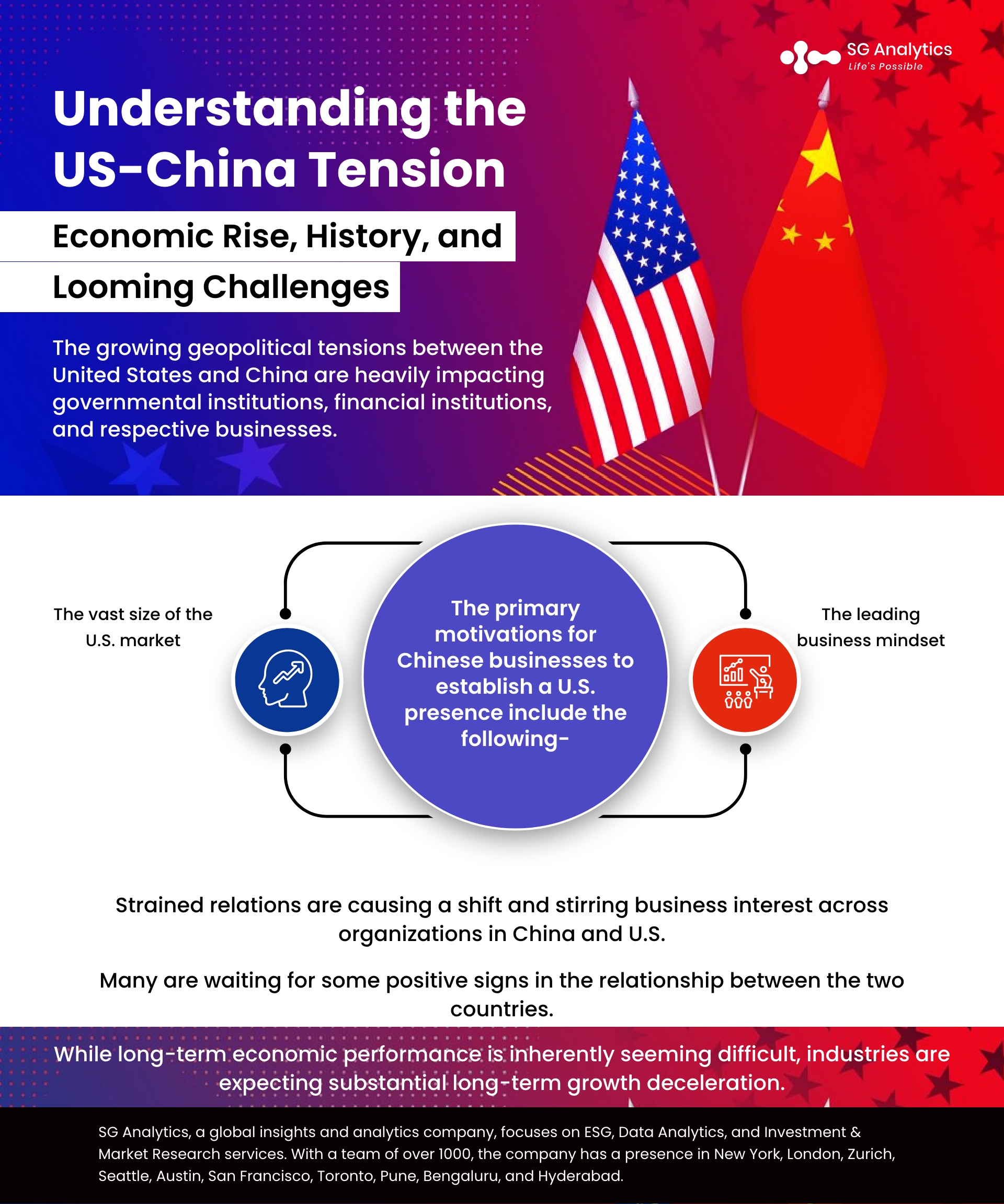The growing geopolitical tensions between the United States and China are heavily impacting governmental institutions, financial institutions, and respective businesses. Irrespective of the bilateral issues, the two big countries are currently navigating troubled waters.
Contentious issues, ranging from Taiwan to Chinese spy balloons and trade, are putting both countries on a collision course. Other financial entities are also raising concerns regarding the growing duopoly between Beijing and Washington.
Investment funds are sensitive to geopolitical tensions and are likely to reduce cross-border allocations. However, the ongoing tensions between the largest economies have led to a 2% decline in global output. With tensions not expected to abate anytime soon, businesses and financial institutions will have to wait and witness the effect in the near future.
Read more: US-China Tech Rivalry: Implications for Venture Capital and the Chips Ecosystem

The Current State of the Economic Relationship
The U.S.-China economic relationship has now reached a critical juncture. Over the last year, the United States has imposed tariffs on imports worth $250 billion from China. And China has retaliated by raising tariffs on U.S. exports.
Businesses are facing riskier circumstances and are exploring ways to reduce the underlying risk. Depending on the sector and how much business an organization has in China, they are exploring ways to prepare for a more challenging path ahead. Going forward, China could put pressure on foreign businesses to choose to do business with either the mainland or Taiwan.
Recent data demonstrated that U.S. exports to China support almost 1.8 million jobs in sectors like services, agriculture, and even capital goods. However, trade with China has impacted and led to job destruction in some U.S. industries.
Multinationals organization have been hopeful about business in China due to an ease in the US-China conflict scenario. A report issued by IMF highlighted that China’s GDP is set to increase by 5.2% this year, one of the world’s best. However, we cannot unsee the fact that China is battling high youth unemployment as well as large debt, particularly in the real estate industry. The country is campaigning to attract more international capital.
Read more: Revealed: Most Polluted Cities in the United States in 2023
But due to the constant strains between the U.S. and China, business leaders are critically weighing in opportunities. In a survey published by the Beijing-headquartered American Chamber of Commerce in China: almost 87% of respondents were pessimistic about the outlook. The American Chamber of Commerce in Shanghai is deemed one of the world’s largest overseas AmCham groups, with approximately 3,000 members. This comprises Deloitte, Ford, Cisco, Apple, and PayPal, along with prominent U.S. companies in Shanghai, including BlackRock and Disney.

Amid this rising tension, the revenue of Chinese companies in the U.S. has weakened than in the previous year, reported the chamber report. The report also highlighted that the percentage of Chinese companies that witnessed a fall in their revenue in 2022 rose to 37% from 26% the year earlier. And the shares of businesses whose revenue increased declined to 42% from 54%.
The bilateral tensions are weighing in as the No. 1 concern for Chinese companies with investments in America. And further deterioration of the rivalry in U.S.-China relations is set to add to the existing burden.
Key Highlights
-
China is likely to experience a substantial long-term growth slowdown due to strained relations with the U.S., along with demographic decline and the limits of capital-intensive growth.
-
With continued broad policy success, the annual economic growth is set to slow down to about 3% by the year 2030 and 2% by 2040.
-
While China can still become the world’s largest economy, it would never get to enjoy a meaningful lead over the U.S.
Read more: US Job Growth Report: Why is the Market Slowing Down?

Tensions between the two countries are weighing in and posing a danger to American businesses. Chinese businesses operating across the Pacific Ocean in the U.S. are also undergoing a similar worry. The bilateral tensions have been hurt by Beijing’s close relationship with Russia. They have also been suspected of sending a spy balloon over sensitive military parts of the U.S. Differences over Taiwan and rising concerns about data security for American users of TikTok - China’s popular platform, has severely affected American companies doing business in the country.
Macroeconomic issues are also topics of concern for both countries. Other cited issues include unstable U.S. policies toward foreign investments, difficulty in recruiting and maintaining talent, barriers to employment-based visas and immigration programs, and high compliance costs in the U.S. Further down the list; both countries are also facing difficulties in obtaining approval of licenses or permits, along with the low acceptance of Chinese and Asian brands in the U.S.
The primary motivations for Chinese businesses to establish a U.S. presence include the following-
-
the vast size of the U.S. market
-
the leading business mindset
Reports have presented that one in every four companies in the past year surpassed their expectations in the U.S. While half met them, a quarter fell below.

The concerns of U.S. organizations that underpin these bilateral trade tensions arise from specific practices endemic to China’s economic model. The framework systematically tilts the playing field in favor of Chinese enterprises domestically as well as globally. Due diligence is vital to do business in China, as it is elsewhere. It enables organizations to gain a better understanding of the market, industry, or acquisition target. And without proper due diligence, foreign businesses cannot invest in new projects in China.
Read more: Inflation Reduction Act Likely to Boost US EV Industry
In Conclusion
Strained relations are causing a shift and stirring business interest across organizations in China and U.S. Many are waiting for some positive signs in the relationship between the two countries and their economies.
2022 was a rough year, and many investment firms are now looking forward to the situation slowly returning back to historic norms. The advances are still constrained by looming concerns about security issues as well as the economic outlook. However, despite being on track to emerging as the world’s largest economy, China is struggling to avoid a future of significantly slower long-term growth.

The U.S.-China economic relationship offers more benefits to the United States than is commonly understood. Irrespective of the costs, the frequent focus of the administration on these bilateral deficits is not a meaningful touchpoint for assessing U.S.-China trade or the impact of the situation on employment. To assess what may constitute a sustainable economic relationship, it is critical for businesses to gain a clear understanding of the costs and benefits of U.S. trade as well as investment with China.
The future of the ongoing tension is set to be of great importance for both China and the U.S. While long-term economic performance is inherently seeming difficult, industries are expecting substantial long-term growth deceleration. However, reliance on investment-driven growth is likely to be hampered, leading to slowing productivity growth. Many reports have highlighted that China could likely continue to sustain robust growth averaging 5% a year or higher by the year 2030. To look further ahead, most suggest that China could witness an average growth of about 3.5–4% per year over the decades to 2050.
With a presence in New York, San Francisco, Austin, Seattle, Toronto, London, Zurich, Pune, Bengaluru, and Hyderabad, SG Analytics, a pioneer in Research and Analytics, offers tailor-made services to enterprises worldwide.
A leader in Market Research, SG Analytics enables organizations to achieve actionable insights into products, technology, customers, competition, and the marketplace to make insight-driven decisions. Contact us today if you are an enterprise looking to make critical data-driven decisions to prompt accelerated growth and breakthrough performance.









